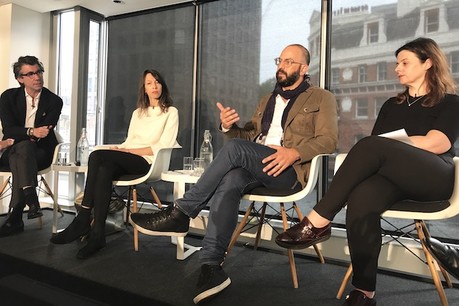
Despite all the twists and turns to have happened in the news industry in 2016 and 2017, publishers are optimistic that quality journalism will prevail, and that their audiences will continue to increase their support for good reporting going forward.
Today (28 June) in London, a panel of speakers from BuzzFeed, BBC, Financial Times and Facebook discussed some of the main findings from the latest Digital News Report published by the Reuters Institute for the Study of Journalism (RISJ) on 22 June.
For the research commissioned by RISJ, YouGov conducted questionnaires at the beginning of 2017 with more than 70,000 people in over 30 countries.
Nic Newman, lead author of the report, outlined some of the main findings from the research: trust in the news media and social media is low across all markets; social and search expose people to varied news sources, but brand attribution and recognition are low; there is a "shift to new mobile and post-mobile media", with people increasingly using their smartphones and other voice-controlled devices to get news even at home.
Twenty-four per cent of those surveyed said that social media does a good job in separating fact from fiction, while 40 per cent thought that news organisations are good at doing the same.
#DNR17 report found distributed media "often exposes ppl to more sources", contrary to arguments that social media = echo chambers
— Mădălina Ciobanu (@madalinacrc) June 28, 2017
Recent political events in both the US and Europe have seen news organisations enjoying subscription bumps, with readers more eager to support quality reporting.
RISJ found that 29 per cent of those paying for news in the United States, primarily younger audiences, said they do so "to help journalism".
However, Newman pointed out that generally, only 13 per cent of respondents across all countries paid for online news.
The number of readers willing to financially support digital journalism is highest in Scandinavia, at 26 per cent, and lowest in the UK, at 6 per cent, which survey respondents say is due to the fact that publishers are not charging for online access across the board, and if they did, the incentive to pay would be higher.
When asked whether they felt more optimistic or pessimistic about the state of the industry going forward, the panellists regarded themselves as optimistic.
"A few years ago we were probably thinking that we will never get people under 35 interested in news and as we see now, they do pay for news, engage with politics and are quite passionate," said Janine Gibson, editor-in-chief of BuzzFeed UK.
Renée Kaplan, head of audience engagement for the FT, agreed and added: "The idea that fake news is part of the conversation means that news itself is part of the conversation. People paying for Netflix means they are are paying for content online. There is, more than ever, a value for news as a social good in the ecosystem."
Patrick Walker, director of media partnerships, EMEA, for Facebook, mentioned the company's recently updated mission statement, and said Facebook realised that "just connecting the world doesn't necessarily make it a better place".
"We need to find ways to empower news organisations and individuals to connect to each other and not just in their sphere of political thought."
The report also found that brand attribution on social platforms is an issue, with fewer than half of people surveyed saying they could remember the news outlet that produced a story they read on social media.
Facebook wants to 'rid social feed of spammy clickbait' says @Nowherian, similar to fight against spam emails in past few years #DNR17
— Reuters Institute (@risj_oxford) June 28, 2017
Publishers' frustration over their relationship with platforms is still present, James Harding, director of news and current affairs at the BBC, said, because in spite of conversations between both parties happening regularly, "things are not moving fast enough".
Walker said Facebook is working on ways to increase brand visibility in the news feed, as well as looking at the track record of a source to highlight whether or not it is credible.
"It doesn't benefit [Facebook] at all if people think a story is not supported by a credible source," he added.
But brand attribution in distributed environment is a problem as fewer than half could remember the news brand that produced a story #DNR17 pic.twitter.com/NyLpaLiIka
— Federica Cherubini (@fedecherubini) June 28, 2017
Gibson, who pointed out that BuzzFeed's 'No, X did not actually happen' articles debunking claims are among the outlet's most shared stories, explained that both news organisations and platforms have to "think about how we represent and share trusted sources".
"We tend to latch on to one particular thing – this year it has been fake news – and we see everything through that prism," Harding said.
"There are different facets of polarisation, but the way in which we are reporting as news organisations on identity politics, and the way in which we are getting close to communities, geographically or not, matters. It leads to people having a sense of exclusion by the media, which feeds a lack of trust."
The full RISJ 2017 Digital News Report is available here. Lead author Nic Newman will be exclusively sharing more insights into brand attribution in search and on social media at newsrewired on 19 July – click here to see the agenda for the event.
Free daily newsletter
If you like our news and feature articles, you can sign up to receive our free daily (Mon-Fri) email newsletter (mobile friendly).
Related articles
- How do journalists really want to use generative AI?
- What AI can do for your newsroom: tips from Ring Publishing's latest handbook
- Journalists are happy to be disconnecting from platforms, should news organisations be worried?
- 40 essential newsletters every journalist should read
- Creating and developing GenAI workflows in the newsroom, with David Caswell









